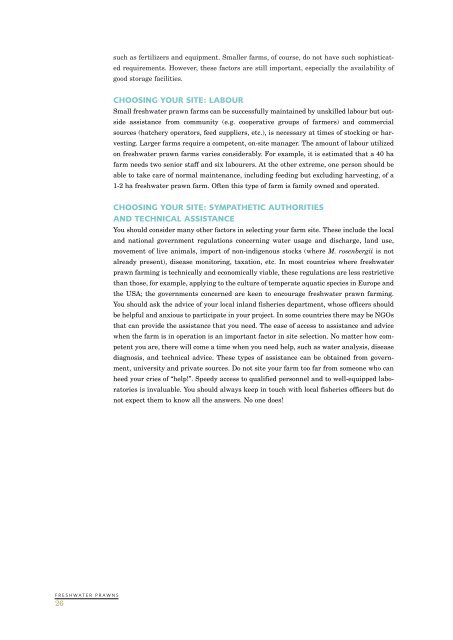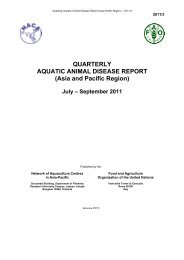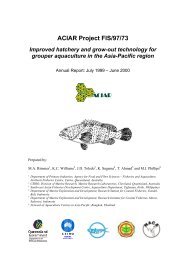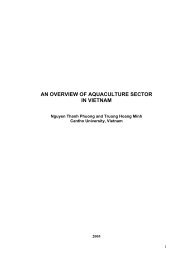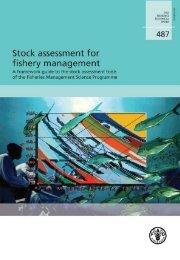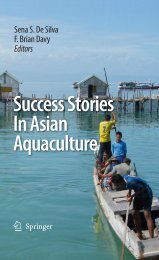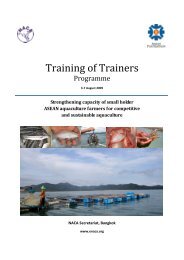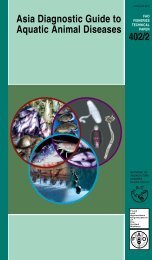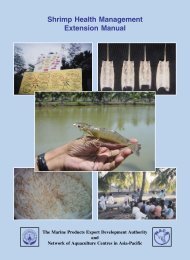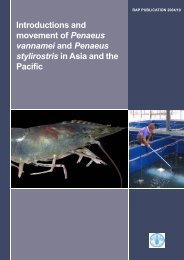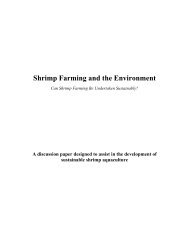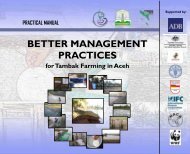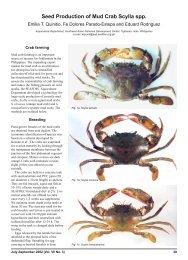- Page 1 and 2: Farming freshwater prawnsA manual f
- Page 3 and 4: The designations employed and the p
- Page 5 and 6: abstractTHE ORIGINAL MANUAL on fres
- Page 7 and 8: table of contentsABSTRACTPREFACEINT
- Page 9 and 10: Feed type 114Measuring feed efficie
- Page 11 and 12: 17. Measuring soil pH 10618. Reason
- Page 13 and 14: 87. Keeping market-sized prawns ali
- Page 15 and 16: major subject of cultivation becaus
- Page 17 and 18: has little relevance, especially be
- Page 19 and 20: (zoeae) are just under 2 mm long (f
- Page 21 and 22: TABLE1Body segments (somites) in Ma
- Page 23 and 24: Figure 5The major malemorphotypes o
- Page 25 and 26: tions, where a breeding stock of bo
- Page 27 and 28: most hatcheries operated on flow-th
- Page 29 and 30: BOX 1Removal of iron and manganeseW
- Page 31 and 32: TABLE 3Artificial brackishwater (12
- Page 33 and 34: TABLE 4Diluting seawater and brine
- Page 35 and 36: mentally cultured at up to 10 ppt;
- Page 37 and 38: cal quality and its lack of predato
- Page 39: CHOOSING YOUR SITE: SOIL CHARACTERI
- Page 43 and 44: perate (usually originating from st
- Page 45 and 46: 3.2 Holding your broodstock in temp
- Page 47 and 48: ing system that consists of a 300 L
- Page 49 and 50: 4CHAPTERHatchery phaseALL FRESHWATE
- Page 51 and 52: SOURCE: HASSANAI KONGKEOand dust. T
- Page 53 and 54: FIGURE17This shows the water flow t
- Page 55 and 56: Figure 21The water inthese larvalta
- Page 57 and 58: FIGURE24Turn-down drains are the be
- Page 59 and 60: FIGURE26Installing a ring main air
- Page 61 and 62: Figure 28Power supplies arenot alwa
- Page 63 and 64: Water dischargeYou should take care
- Page 65 and 66: is recommended. The volume of these
- Page 67 and 68: then multiply to cope with the nitr
- Page 69 and 70: Regular monitoringof larval waterqu
- Page 71 and 72: initial stocking rates shown inBox
- Page 73 and 74: Recommendations forgood larval wate
- Page 75 and 76: FIGURE35Many of the larvae that go
- Page 77 and 78: TABLE 8Hatchery feeding scheduleLAR
- Page 79 and 80: ing to avoid BSN leaving the tank.
- Page 81 and 82: TABLE10The major diseases known to
- Page 83 and 84: Notes on potential disease problems
- Page 85 and 86: FIGURE36aA method of evaluating the
- Page 87 and 88: occurred). You are therefore recomm
- Page 89 and 90: 5CHAPTERPostlarval holdingand nurse
- Page 91 and 92:
Figure 39Substrates can beused in n
- Page 93 and 94:
FIGURE41Postlarvae in plastic bags
- Page 95 and 96:
pH and temperature of the rearing f
- Page 97 and 98:
It is difficult to recommend exact
- Page 99 and 100:
6CHAPTERGrow-out phaseFRESHWATER PR
- Page 101 and 102:
FIGURE44ponds may become low enough
- Page 103 and 104:
FIGURE46Pond banks should have the
- Page 105 and 106:
FIGURE50The dissolved oxygen levels
- Page 107 and 108:
Figure 53Where thetopography of the
- Page 109 and 110:
Figure 56The outletstructure,someti
- Page 111 and 112:
Figure 58This freshwaterprawn pondh
- Page 113 and 114:
FIGURE59 cont.CROSS SECTIONSOURCE:
- Page 115 and 116:
Figure 64Long-shaftaeratorin action
- Page 117 and 118:
there is only a single stocking), t
- Page 119 and 120:
TABLE16Lime requirements for treati
- Page 121 and 122:
semi-intensive stocking rates vary
- Page 123 and 124:
Keeping rootedplants out ofyour pon
- Page 125 and 126:
advantages obtained in temperate cu
- Page 127 and 128:
Polyculture of freshwater prawnswit
- Page 129 and 130:
only increases the availability of
- Page 131 and 132:
Using water-stable feeds provides y
- Page 133 and 134:
MEASURING FEED EFFICIENCYYou should
- Page 135 and 136:
Example of feeding ratefor freshwat
- Page 137 and 138:
allowed to become too low and there
- Page 139 and 140:
found to be hosts for the bopyrid i
- Page 141 and 142:
Figure 81A large BCMacrobrachiumros
- Page 143 and 144:
7CHAPTERHarvesting andpost-harvest
- Page 145 and 146:
FIGURE83You can cull-harvest your p
- Page 147 and 148:
FIGURE85Larger ponds may also be cu
- Page 149 and 150:
Figure 91HarvestingMacrobrachiumros
- Page 151 and 152:
(Figure 95). To kill a batch of 50
- Page 153 and 154:
described earlier in this manual) a
- Page 155 and 156:
Once the prawns arrive at the point
- Page 157 and 158:
properly. They should also be displ
- Page 159 and 160:
ANNEX 1, Figures 1-12Macrobrachium
- Page 161 and 162:
4ANNEXSource, hatching andenrichmen
- Page 163 and 164:
The nutritional quality and physica
- Page 165 and 166:
decapsulation improves the energy c
- Page 167 and 168:
starved versus enriched BSN. Lavens
- Page 169 and 170:
1ANNEX 4TABLEDetermining hatching p
- Page 171 and 172:
4ANNEX 4TABLE Hydrating and decapsu
- Page 173 and 174:
7ANNEX 4TABLE1. Set up the hatching
- Page 175 and 176:
grades the particles and washes the
- Page 177 and 178:
2. Stock estimation when postlarvae
- Page 179 and 180:
animal, particularly within the gil
- Page 181 and 182:
ANNEX 7 FIGURE1The size of the mesh
- Page 183 and 184:
8ANNEXSize managementAS MENTIONED I
- Page 185 and 186:
2. BehaviourThe behavioural charact
- Page 187 and 188:
ANNEX 8 FIGURE3Changing the stockin
- Page 189 and 190:
ANNEX 8 FIGURE4Orange claw (OC) and
- Page 191 and 192:
9ANNEXFarm-made pond feedsTHIS ANNE
- Page 193 and 194:
ANNEX 9, Figure 3Farm-made feedsnee
- Page 195 and 196:
4ANNEX 9TABLEFarm-made grow-outfeed
- Page 197 and 198:
which the requirements are applied.
- Page 199 and 200:
Carapace:Caridean:Cephalon:Chela:Ch
- Page 201 and 202:
Genital pores:Gill chamber:Greenwat
- Page 203 and 204:
Puddling:Rostrum:Salinity:Sequester
- Page 205 and 206:
ConversionsTHIS SECTION OF THE ANNE
- Page 207 and 208:
Financial considerationsSOME COMMEN
- Page 209 and 210:
ReferencesAlston, D.E. & Sampaio, C
- Page 211 and 212:
Fujimura, T. & Okamoto, H. 1972. No
- Page 213 and 214:
New, M.B., Singholka, S. & Vorasaya
- Page 215:
This new manual, which replaces an


